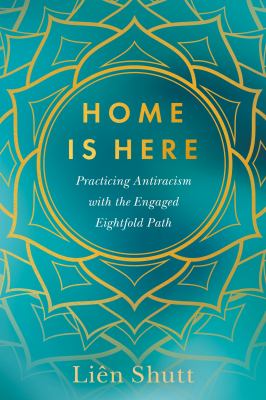Recently, CPL’s new books section by the lobby has been graced with a few Buddhist titles. I’ve read three, in this order: “One Long Listening: A Memoir of Grief, Friendship, and Spiritual Care” by Chenxing Han, “Home Is Here: Practicing Antiracism With the Engaged Eightfold Path” by Liên Shutt, and finally, “It’s Okay Not to Look for the Meaning of Life: A Zen Monk’s Guide to Living Stress-Free One Day at a Time” by Jikisai Minami. Each book has soothed and challenged me in different ways. If the lake of your mind is feeling cloudy or clogged, one or more of these titles may be of benefit to you.
 Chenxing Han’s “One Long Listening” is a glossy black volume patterned with fluid golden lines that recall the rings of a tree or waves of sound. I was drawn to the title, which uses “listening” not as a verb but as a noun instead; something we commit to and create together. The title’s words appear exactly once, on a page that is mostly blank space (“I realized today that our friendship has been one long listening. / I’m still listening. / It feels like you are too. / I love you. / I miss you.”)
Chenxing Han’s “One Long Listening” is a glossy black volume patterned with fluid golden lines that recall the rings of a tree or waves of sound. I was drawn to the title, which uses “listening” not as a verb but as a noun instead; something we commit to and create together. The title’s words appear exactly once, on a page that is mostly blank space (“I realized today that our friendship has been one long listening. / I’m still listening. / It feels like you are too. / I love you. / I miss you.”)
In this passage, Han addresses a friend who has died. The story of this transformative friendship is one of the main threads of the book. Han writes to and about her friend with breathtaking tenderness, and this love and consideration is present in all threads, especially in the stories from her time working as a hospital chaplain — comforting patients, losing them, learning from them, and, always, listening to them. Her experiences in grief and chaplaincy are suffused with her practice of Buddhist principles, such that she is not writing about Buddhism so much as she is writing from it.
Han’s poetic, unhurried language is healing to read. I enjoyed this book as slowly as I could bear — between sips of tea, on sunny benches and shaded ones, at work, at home — any time my mind was seeking a release of tension and a lowering of volume. Each time I put the book back down, it was like blinking my eyes open from meditation — the world seemed brighter and clearer, and I felt prepared to take in its parts with more focus and kindness.
The next time I checked the new books section for call numbers starting with 294.3, I was fortunate to find Liên Shutt’s “Home Is Here” (incidentally, foreworded by  Chenxing Han). I was compelled by the mission of Shutt’s book: to tie Buddhist practices to practices of antiracism. I have often been disappointed by the abstractions of Buddhist literature; how “suffering” is described only in broad terms, without identifying the systems and constructs that make people suffer. Shutt addresses this gap in the literature with clarity and conviction.
Chenxing Han). I was compelled by the mission of Shutt’s book: to tie Buddhist practices to practices of antiracism. I have often been disappointed by the abstractions of Buddhist literature; how “suffering” is described only in broad terms, without identifying the systems and constructs that make people suffer. Shutt addresses this gap in the literature with clarity and conviction.
Shutt shares her experiences with hateful speech and oppressive encounters as a queer Asian American woman, many of them from within whitewashed monasteries that dismiss reports of racism as the victims’ own failure to embrace the Buddhist teaching of oneness. Shutt applies a kind yet critical lens to these painful memories, showing the reader what it means to recognize harm and affirm oneself — in short, how to cope with racism (a fraught, tangled task, but not an impossible one).
My favorite element of this book was the guided meditations. They arrive in the middle of chapters as opportunities to reflect and recenter. The meditations are grounded in affirmations, which Shutt encourages the reader to send in multiple directions — inwards towards oneself, and outwards towards all beings. I’ve held on to a few favorites, which I’ll share with you now (How does it feel to read these, and to mean them?):
May peace and ease be accessible to me here and now.
May I connect to safety and strength whenever it’s needed.
Let me be able to bring mercy and tenderness to my pains and sorrows.
May I be happy.
 When I went to return “Home is Here” to its place on the new books cart, I noticed a small hardcover bearing these bold words: “It’s Okay Not to Look for the Meaning of Life.” Written in simple prose and short chapters, Jikisai Minami’s book is a different kind of offering from Han and Shutt’s heartfelt, hard-won reflections. “Don’t do what you want to do, do what you should do,” Minami suggests nonchalantly. “Besides life and death, nothing is a big deal.”
When I went to return “Home is Here” to its place on the new books cart, I noticed a small hardcover bearing these bold words: “It’s Okay Not to Look for the Meaning of Life.” Written in simple prose and short chapters, Jikisai Minami’s book is a different kind of offering from Han and Shutt’s heartfelt, hard-won reflections. “Don’t do what you want to do, do what you should do,” Minami suggests nonchalantly. “Besides life and death, nothing is a big deal.”
Not all of Minami’s wisdom sat right with me, especially his thoughts on human connection (something like “it’s cool, but not necessary, and if a relationship becomes stressful, end it”). Readers like me, who like the real-time reckoning, who prefer parsing and unpacking alongside the author rather than receiving instructions from them, may find Minami’s style jarring. Still, I can’t deny that his writing quieted something in my brain, some background noise that I hadn’t known was there.
In any case, I have an idea of what Minami might say to my hesitations about his advice: If you don’t need it, don’t use it, and if you’re not ready, then wait. Han and Shutt show a similar kind of restraint and patience in their works. None of these books insist on or demand anything. They acknowledge their own uncertainty. These books are here if you need them, and you need only take what rings true (and then, you give it all back).
It occurs to me now how fitting it is to check out a Buddhist book from the library, to experience your own transformation with a particular text only to offer it back up to the cycle of borrowing, to recognize the impermanence of ownership and all things (But maybe I’m trying too hard to wrap this up. I don’t mean to force a metaphor! What I mean to say is: Thank you for listening. May peace and ease be accessible to you here and now. May you connect to safety and strength whenever it’s needed. May you be happy.).
-Karena


